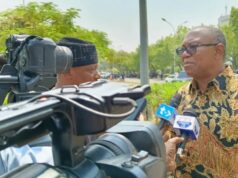The Lagos Chamber of Commerce and Industry (LCCI) has said, the 12.2 per cent 2024 proposed budget rate to Nigeria’s Gross Domestic Product (GDP) remains the lowest in Africa.
The chamber noted that, relative to Nigeria’s GDP size, the proposed budget is 12.2 per cent, which is very low compared to its African peers like South Africa, with a government expenditure to GDP ratio of 32.5 per cent, Egypt (24.7 per cent), Kenya (23.0 per cent) and Ghana (27.1 per cent).
The director-general of LCCI, Dr. Chinyere Almona, who stated that this is a serious issue that needs to be addressed by the government, in the light of its renewed hope agenda, added that, “the proposed 2024 budget of N27.5 trillion ($33.4 billion) is the biggest in the country’s history, representing 21.4 per cent increase compared to N22.65 trillion in the previous year with strong focus on defence, internal security and job creation.
“It is commendable to note that the strategic objective of the expenditure policy is expected to tackle macro-economic stability, investment environment optimisation, human capital development, poverty reduction and social security.”
She explained that “the assumptions are conservative, particularly in terms of oil prices and exchange rates.
However, daily oil production remains a major concern due to persistent underinvestment, vandalism, oil theft, and rising production costs in the oil sector.”
Beyond the figures and policy statements contained in the 2024 Appropriation Bill, the Chamber highlighted that, “the government must improve its budget performance in terms of capital expenditure in 2024. Over the years, the performance of the capital expenditure has been very low relative to the recurrent expenditure, with implications for the country’s infrastructure sector. The situation is worrisome and calls for urgent solutions.
“Particular attention must be paid to investing more in transport infrastructure in order to mitigate the high cost of fuel and resolve the many logistical challenges that have impacted the movement of goods across the nation.”
Almona further said:“looking beyond oil revenues, the government must build investors’ confidence and enhance our forex earnings through non-oil exports. We need to invest more in export infrastructure through automation and implementation of critical port reforms to reduce the bottlenecks in our export logistics and processes.
“In addressing the most significant components of human capital development, we urge governments at all levels to be committed to significantly improving budget implementation in strategic sectors of the economy, including agriculture, education, health, infrastructure, and security.
“Efforts must be made to scale up revenue collection by the Federal Inland Revenue Service (FIRS) through consistent tax administrative measures, digitaliation, and policy reforms.”
The Lagos Chamber of Commerce and Industry (LCCI) has said, the 12.2 per cent 2024 proposed budget rate to Nigeria’s Gross Domestic Product (GDP) remains the lowest in Africa.
The chamber noted that, relative to Nigeria’s GDP size, the proposed budget is 12.2 per cent, which is very low compared to its African peers like South Africa, with a government expenditure to GDP ratio of 32.5 per cent, Egypt (24.7 per cent), Kenya (23.0 per cent) and Ghana (27.1 per cent).
The director-general of LCCI, Dr. Chinyere Almona, who stated that this is a serious issue that needs to be addressed by the government, in the light of its renewed hope agenda, added that, “the proposed 2024 budget of N27.5 trillion ($33.4 billion) is the biggest in the country’s history, representing 21.4 per cent increase compared to N22.65 trillion in the previous year with strong focus on defence, internal security and job creation.
“It is commendable to note that the strategic objective of the expenditure policy is expected to tackle macro-economic stability, investment environment optimisation, human capital development, poverty reduction and social security.”
She explained that “the assumptions are conservative, particularly in terms of oil prices and exchange rates.
However, daily oil production remains a major concern due to persistent underinvestment, vandalism, oil theft, and rising production costs in the oil sector.”
Beyond the figures and policy statements contained in the 2024 Appropriation Bill, the Chamber highlighted that, “the government must improve its budget performance in terms of capital expenditure in 2024. Over the years, the performance of the capital expenditure has been very low relative to the recurrent expenditure, with implications for the country’s infrastructure sector. The situation is worrisome and calls for urgent solutions.
“Particular attention must be paid to investing more in transport infrastructure in order to mitigate the high cost of fuel and resolve the many logistical challenges that have impacted the movement of goods across the nation.”
Almona further said:“looking beyond oil revenues, the government must build investors’ confidence and enhance our forex earnings through non-oil exports. We need to invest more in export infrastructure through automation and implementation of critical port reforms to reduce the bottlenecks in our export logistics and processes.
“In addressing the most significant components of human capital development, we urge governments at all levels to be committed to significantly improving budget implementation in strategic sectors of the economy, including agriculture, education, health, infrastructure, and security.
“Efforts must be made to scale up revenue collection by the Federal Inland Revenue Service (FIRS) through consistent tax administrative measures, digitaliation, and policy reforms.”







